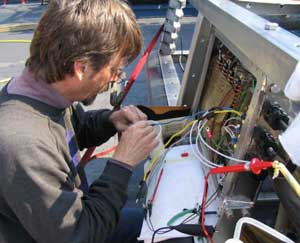Electrical Engineer
Tasks & duties

Electrical engineers:
-
develop and design, or update specifications and designs for electrical systems and equipment
-
design ways to generate, distribute and manage electricity
-
design ways to control electrical processes using automation techniques and computers
-
examine the safety aspects of the planned work
-
calculate the cost and amount of materials required for projects
-
write reports and develop instruction manuals for the installation of new electricity systems and equipment
-
supervise the installation and maintenance of systems and equipment
-
oversee the testing of new electricity systems and correct any faults
Electrical engineers may also manage projects and bid for contracts. The range of projects includes infrastructure such as power stations, water and waste water treatment plants, buildings such as commercial and residential properties, factories, and universities.
Skills & knowledge

Electrical engineers need to have:
-
knowledge of circuit theory, heavy current or power electrical engineering and other electrical principals
-
an understanding of the equipment and safe practices associated with electrical engineering
-
knowledge of electronics
-
knowledge of the acts of legislation, resource management and industry standards that apply to electrical engineering
-
design and drawing skills, including knowledge of computer-aided design (CAD)
-
mathematical skills
-
project management skills
-
problem-solving and organisation skills
-
excellent communication skills as they spend a lot of time interacting with people
Entry requirements
To become an electrical engineer you need a four-year Bachelor of Engineering. However, a Bachelor of Engineering Technology or a National Diploma in Engineering with relevant work experience may also be acceptable.
Secondary education
A tertiary entrance qualification is required to enter further training. Year 12 Certificate of Education or Higher School Certificate . Useful subjects include maths with calculus, technology, physics and chemistry.
Tertiary education
A Bachelor of Engineering, Bachelor of Engineering Technology or a National Diploma in Engineering with relevant work experience is normally required.
Training on the job
Skills are gained on the job. Ongoing training is available from various tertiary providers and professional bodies in areas such as safety and new engineering techniques, as well as from product suppliers.
Useful experience
Any previous experience working as an electrician, mechanic or an electrical engineering technician is useful for.
Related courses
Electrical Engineering
Electrical Fitting, Electrical Mechanics
Power Line Installation and Maintenance
For more information, please refer to myfuture.
Document Actions
